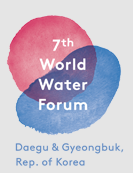The world's largest water meeting, the Seventh World Water Forum, concluded with a fresh commitment to action towards four overarching goals: water security for all; water for development and prosperity; water for sustainability; and constructing feasible implementation mechanisms.
 17 April 2015: The world’s largest water meeting, the Seventh World Water Forum, concluded with a fresh commitment to action towards four overarching goals: water security for all; water for development and prosperity; water for sustainability; and constructing feasible implementation mechanisms.
17 April 2015: The world’s largest water meeting, the Seventh World Water Forum, concluded with a fresh commitment to action towards four overarching goals: water security for all; water for development and prosperity; water for sustainability; and constructing feasible implementation mechanisms.
The Forum (WWF 7) took place from 12-17 April 2015, in Daegu, Republic of Korea, on the theme, ‘Water for our Future.’ The Forum comprised multiple processes totalling over 400 separate sessions, including political, scientific and regional discussions, while side events, exhibits and several award ceremonies took place in and around the conference venue.
A High-Level Special Session on the Two Water Conventions celebrated the entry into force of the Convention on the Law of the Non-Navigational Uses of International Watercourses (the UN Watercourses Convention) in August 2014 and the global opening of the 1992 Convention on the Protection and Use of Transboundary Watercourses and International Lakes, also known as the UN Economic Commission for Europe (UNECE) Water Convention. The event organizers – UNECE, Green Cross International, the International Union for Conservation of Nature (IUCN) and the World Wide Fund for Nature (WWF) – highlighted that while the draft Sustainable Development Goal (SDG) on water recognizes the importance of transboundary water management, over 130 countries have yet to sign on to either of the water conventions.
Several organizations launched publications at the forum. The Food and Agriculture Organization of the UN (FAO) and the World Water Council released a paper, ‘Towards a Water and Food-Secure Future,’ calling on government and private-sector actors to apply water conservation approaches to the production of crops, livestock and fish so as to safeguard water resources that are coming under greater pressure due to increased global food demand. The UNECE and the International Network of Basin Organizations (INBO) shared a compilation of good practice and lessons learned on ‘Water and Climate Change Adaptation in Transboundary Basins,’ drawing on experiences from many river basins, including the Danube, Dniester, Okavango and Mekong river basins.
The UNECE also organized an interactive session showcasing examples of policy frameworks to ensure the realization of the human right to water, including the use of the ‘Equitable Access Score-card’ in several countries.
The Global Environment Facility (GEF), the world’s largest financier of transboundary water resource management, linked cooperation on water management with regional integration, peace and economic development, and pledged to support countries to take action on water-energy-food nexus issues as entry points for cooperation.
The UN Economic, Cultural and Scientific Organization Institute for Water Education (UNESCO-IHE), together with the University for Peace (UPEACE) and Oregon State University (OSU), launched a Masters’ Programme on Water Cooperation and Peace, highlighting the role of sound water management in addressing conflict at multiple levels.
At the closing ceremony, a consortium of 20 Korean and international water-related organizations announced the Daegu & Gyeongbuk Implementation Committee (DGIC), which will seek to put into practice various ideas shared during the Forum. The Government of the Republic of Korea presented an “action roadmap” and monitoring system as key deliverables of the Forum, which can be used as guidelines for addressing water issues.
In a joint declaration, ministers and their deputies from 120 countries affirmed their support for the water goals and targets under the forthcoming Sustainable Development Goals (SDGs) and, noting that water is a major issue in tackling climate change, committed to ensuring a successful outcome at the 21st session of the Conference of the Parties (COP21) to the UN Framework Convention on Climate Change (UNFCCC).
Benedito Braga, President of the World Water Council, said that pledges made during the Forum will be conveyed to the ongoing negotiations of SDGs in New York, the US, and emphasized that the Forum had sent a clear signal to the world that, “We know what needs to be done and we are getting on with the job.” [7th World Water Forum Website] [World Water Council Web Page on Forum] [Ministerial Declaration] [UN Press Release] [UNECE Web Page on Forum] [Water and Climate Change: Adaptation in Transboundary Basins] [Publication: Towards a Water and Food Secure Future] [GEF Press Release] [UNESCO-IHE Press Release] [World Water Forum Closing Press Release]